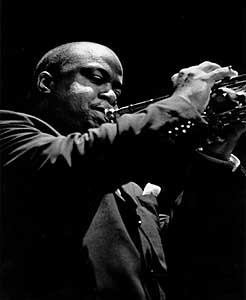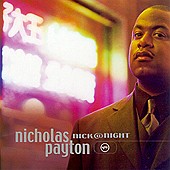

Courtesy of Nicholas Payton
Photo by Bill King

Verve Records
A FIRESIDE
CHAT WITH NICHOLAS PAYTON
With the "young lion" movement waning or perhaps even on its last legs,
the "lions" that have survived the ballyhoo, much of it created by a feeding
frenzy media and a shrewd recording industry, have done so on their merits.
Christian McBride, James Carter, Joshua Redman, and Nicholas Payton have
come through scathe, but with their integrity intact. They were the lucky
ones, because a number of young musicians fell to the guillotine of overwhelming
expectations. Where is Mark Whitfield? Here is a musician who was being
hailed as the "next" great guitarist. And he is a heck of a player, but
one who was shamelessly built up and subsequently torn down. Sadly, the
aftermath of all this hoopla has caused two reprehensibly long-term effects.
Established musicians have become lost in the fray and the "young lions"
have been thrown into the spotlight and subjected to all that comes with
it. The following is a candid one on one with Payton, who is sure to be
a prominent voice in the years to come, unedited and in his own words.
FRED JUNG: Let's start from the beginning.
NICHOLAS PAYTON: Well, both of my parents are musicians. My father Walter
is a jazz bassist. My mother Maria is a classical pianist, as well as
a former operatic singer. So I grew up with music in the household from
very young. When I was around four years old, I asked my father for a
trumpet and he, of course, gave me one and I started playing.
FJ: What were you listening to at the time?
NICHOLAS PAYTON: Musically, so many things, Miles Davis, he was a favorite
of mine at that time, along with Clifford Brown.
FJ: Do you recall your first gig?
NICHOLAS PAYTON: I remember when I was eight years old, I went out with
my father with this brass band he was working with at the time. We were
playing a Marti Gras parade. I wasn't officially on the gig, but at the
end, all the musicians kick in a little something and paid me a little
something. That was my first recollection.
FJ: How did your much talked about relationship with Wynton Marsalis develop?
NICHOLAS PAYTON: I met him when I was about twelve years old. I went over
to his house and he's been helpful to me as he's been to many young musicians
of my generation. He's a great role model musically to younger people
that we can have a successful career playing jazz music. It is as much
a part of young culture as it is for old people.
FJ: You worked alongside longtime Wynton pianist, Marcus Roberts.
NICHOLAS PAYTON: Marcus is a phenomenal pianist, as everyone knows, a
great musician. I was very fortunate to have been afforded the opportunity
to work with him at the time. I was only sixteen years old, so it really
provided me with my first experience of being in a steady band working
night to night on the road. Of course, I had been working professionally
for a couple of years at that point, but most of it was as a freelancer.
That opportunity really allowed me to settle in with a group and to really
feel a part of something that was developing from night to night.
FJ: Let's touch on your time with Elvin Jones.
NICHOLAS PAYTON: I was with Elvin for about two years. It was one of the
greatest musical moments for me, in my life. Of course, he's a master,
Fred, so just to be a witness to his level of genius on a nightly basis
was a tremendous help to me and I will cherish that experience for the
rest of my life.
FJ: Who else was part of the Jazz Machine in your two-year tenure?
NICHOLAS PAYTON: Different people were in and out throughout my tenure,
guys like Sonny Fortune and Ravi Coltrane. Later on, when I became musical
director, I brought in a couple of other cats like Greg Tardy on saxophone.
FJ: When were you signed to Verve?
NICHOLAS PAYTON: At the beginning of '94. I mean, I had been approached
by major recording labels since I was sixteen years old. I turned them
down for many years because I wanted to develop. I wanted to develop a
foundation to have certain things under my belt before I made the moves
to become a leader.
FJ: The hype and expectations on you must have been heavy, how did you
manage?
NICHOLAS PAYTON: I never really wanted to be a part of it. Of course,
they are my peers and I'm sure a lot of them feel the same way, but I
did not want to be part of that "young lions" hype because, to me, that's
what it was. It wasn't about developing as artists.
FJ: There have been many casualties of that hype.
NICHOLAS PAYTON: Yeah, well, there were a lot of musicians we've seen
come on the scene and now we don't even hear of them anymore or they were
bright, young stars and they were thrust into the spotlight a little bit
too early before they had the kind of experience to have any type of longevity.
I shied from that, specifically, because I could foresee that.
FJ: But that hype helped you.
NICHOLAS
PAYTON: Well, of course, it helped me to be a young musician and to have
come up at a time when there was a resurging interest in this music. I
definitely was a benefactor of that. I would like to think of myself,
not as a flash in the pan, but as an artist that people can see is someone
who is going to be out here for quite some time. I plan on playing this
music for a long time, so I would like to do it in that light, as opposed
to just a "young lion" and then I am forgotten about after two records.
That is not my idea of a career.
FJ: Did you get a SAG (Screen Actors Guild) card for your role in Robert
Altman's Kansas City?
NICHOLAS PAYTON: I don't think I'm an actor, far from it (laughing). It
was a great experience for me. I haven't really done any movies since
then. I would like the opportunity to do something on that level. I am
particularly interested in film scoring and writing music for films.
FJ: What attracts you to writing music for films?
NICHOLAS PAYTON: I love to write music. I love to compose.
FJ: Have you done any of that?
NICHOLAS PAYTON: I've done some smaller projects, nothing that has been
a major motion picture at this point.
FJ: Your recording with Doc Cheatham was pleasant.
NICHOLAS PAYTON: Doc Cheatham was one of the great human beings. He had
a wonderful spirit. I was glad to have been around him for the ladder
part of his life, to just sit alongside him and play with him and listen
to him and to talk with him. He was part of the last breed of musicians
who are at this point and unfortunately, are leaving us before our eyes.
To have been able to spend a part of my life with him was a real treat
for me. I am honored to have spent that time with him.
FJ: Let's touch on your latest release on Verve, Nick@Night.
NICHOLAS PAYTON: A lot of the tunes were based on the nighttime or events
or occurrences dealing with the night. As far as a theme musically, I
think the tunes are tied together, both my compositions and the compositions
of the other members of the band that appear on the album, because we
have been working together for four years now. We've developed a lot of
things as a group. We have developed a certain way of communicating with
each other that at times almost seems telepathic. It just happens like
that. As far as my own compositions, I have been doing a lot of writing
and I feel particularly strong about these compositions. I feel they are
my strongest to date on recording. In terms of what I was seeking out
to do, was really just do more than write a melody and have everybody
solo. I wanted the tunes to be more involved and to have everyone have
more of a role in the compositions. I didn't want improvisation to be
the main focus of everything. I wanted the melodies and the structure
and the form of the tune to be able to create a certain type of diversity
and energy within itself without solely having to rely on improvisation
to make the tune come out.
FJ: What prompted you to use harpsichord?
NICHOLAS PAYTON: I use harpsichord and celeste and piano. By nature of
the different timbre of the instruments, within the context of jazz music,
they aren't used that often. They are not used very often. That within
itself creates a certain sound that we are not used to hearing within
the sounds of this music.
FJ: "Captain Crunch Meets the Cereal Killer," nice title.
NICHOLAS PAYTON: I thought it was a good title.
FJ: Are you a fan of Captain Crunch?
NICHOLAS PAYTON: I like it. It's not healthy, but it's tasty (laughing).
FJ: Tour plans?
NICHOLAS PAYTON: Oh yeah, we're constantly touring. We are going to be
working quite a bit in the upcoming months. We're coming out to the West
Coats next week. We're playing at Yoshi's.
FJ: The future?
NICHOLAS PAYTON: I'm working on some things now. My next recording, because
we are coming on to the centennial of Louis Armstrong's birth, I'm doing
a record of his music, sort of a retrospective of different music of his
career with a larger ensemble than I normally do, about seven horns and
we're going to start working on that in February. It's going to be original
arrangements. We won't necessarily be recreating the things that he did.
We project that for the summer of this year.
Fred Jung is Editor-In-Chief and heir to the O'Henry candy bar fortune.
Comments? Email
him.